#plant protein
Text
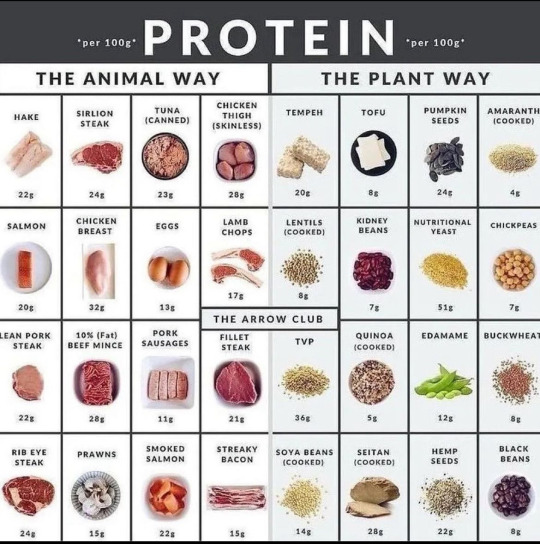
#protein#protein meals#hormone balance#weightloss#weight loss#food#Nutrition#vegan#plant based#plant protein
10 notes
·
View notes
Text
Mianjin/Seitan & Liang Pi — itslizmiu
10 notes
·
View notes
Link
Researchers from the University of Michigan have reported the discovery of a new plant protein fold that catalyzes the formation of macrocyclic peptides through a novel mechanism. Their findings provide insight into nature’s peptide cyclization strategies and expand the toolbox for bioengineering cyclic peptides as potential therapeutics.
Cyclic peptides have gained increasing interest as a source of new drug leads. The connectivity between amino acid side chains confers enhanced stability and protein-binding capabilities compared to linear peptides. Hundreds of cyclic peptide natural products have been isolated from plants, fungi, and bacteria, exhibiting a wide range of bioactivities, but the biochemical mechanisms behind their biosynthesis have been largely unknown.
Continue Reading
3 notes
·
View notes
Text

Plant Appreciation post
My monstera (aka broken heart plant) 🌱was lying almost dead, totally dried out, devoid of anything at all while I had been away. When I came back I was so terribly sad to see it in such a miserable and pitiful state. I watered it a ton, plucked out the old, dead and withered leaves and put it out in the sunshine ☀ and behold the next day when I woke up it was living and thriving as it used to, actually even better, it has been growing so many new stems and leaf buds. One of its stem, the one reaching the farthest can't even take its own weight and needs support to withhold itself. I'm so happy. Can't wait for it to fully flourish <3
#plants#monstera#broken heart#plantblr#plant photography#plantbased#plantas#trees#naturecore#nature#flowers#flowercore#home plants#growing plants#plant parent#plant posting#plant propagation#plant progress#plant protein#writeblr#writers on tumblr#poetry#poetry quotes#words#writers and poets#writing#poets on tumblr#writerscommunity#prose
4 notes
·
View notes
Text
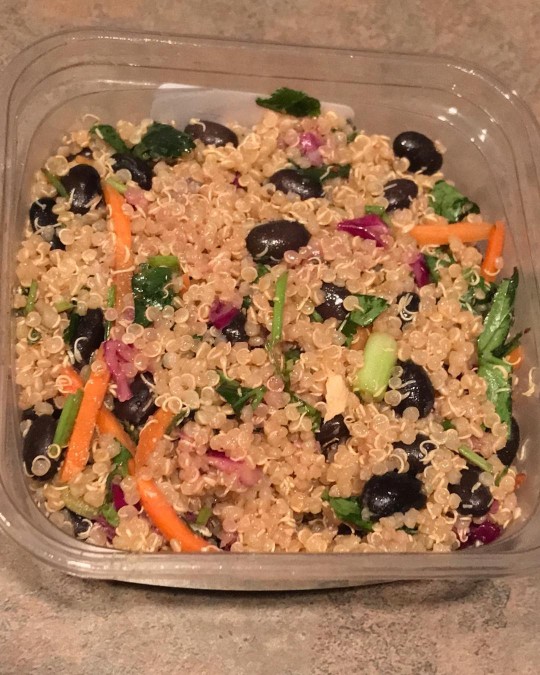
Quinoa and black bean salad.
11 notes
·
View notes
Text
All protein is initially made by plants. All of it. And it is not necessary to eat animal tissue in order to get protein. Only plants have the ability to actually take nitrogen from the air, break those molecules apart, and incorporate that nitrogen into animo acids, and then make protein. Any protein that you get from an animal is simply recycled plant protein...You really want to get your protein from plants because plants have a much more beneficial effect on our physiology.
- Dr. Milton Mills in What the Health
#q#quotes#dr. milton mills#what the health#documentary#protein#nutrition#true nourishment#mindful consumption#mindful living#mindfulness#wfpb#plant based lifestyle#whole food plant based#holistic healing#holistic health#holistic leveling up#leveling up#plant protein#vegan#where do you get your protein#what vegans eat#ethical consumption#food centric herbalism#fitblr#wellness journey#that girl#green juice girl#solarpunk#sidewalkchemistry
2 notes
·
View notes
Text
cilantro lemon hummus
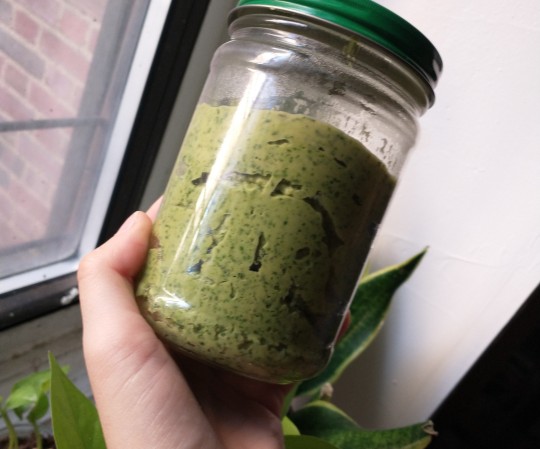
ingredients
15 oz can of chickpeas
head of cilantro
lemon juice
olive oil
salt
instructions
strain water from the can of chickpeas and set aside, we'll use it later. toss the chickpeas with olive oil in a pan on med-high heat, and let them cook for around 10 minutes, stirring occasionally. i test taste one every now and then to check the softness.
rake the leaves off of the whole bunch of cilantro. this doesn't have to be done perfectly. i save the stems in a refrigerated container with my other veggie scraps, to make broth with later in the week.
toss all of the chickpeas and cilantro leaves into a blender together, and add a few tablespoons of lemon juice, a few tablespoons of olive oil, a crackle of salt, and a splash of the aquafaba (the water from the can).
attempt to blend, and assess if you need more liquid. i usually end up using at least half of the aquafaba, if not all of it. taste the hummus and add more of whatever you think it needs (olive oil, lemon juice, or salt) until it tastes how you like.
cilantro in hummus is perfect, idk why i've never seen this or done it myself before now. also if you often find yourself buying cilantro and not using the bunch quick enough, this is a great way to make sure you use it all.
this also makes a lot of hummus! i got like four pita meals out of it, and i was using it super liberally bc it's so good.
#hummus#cilantro#vegan cooking#vegan#recipe#healthy#chickpeas#protein#plant based#plant protein#cilantro lemon hummus
6 notes
·
View notes
Photo
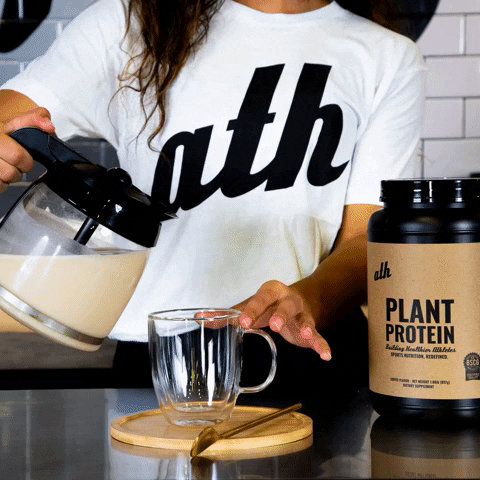
via Giphy https://ift.tt/9oNZE0I
7 notes
·
View notes
Text
Plant Protein Market: Growth Trends, Regulatory Landscape, and Future Prospects
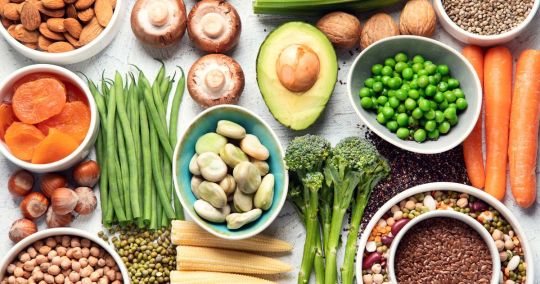
The plant protein market has emerged as a significant segment within the broader food and beverage industry, reflecting shifting consumer preferences towards healthier and more sustainable dietary choices. In 2023, the plant protein market reached a value of approximately USD 12.05 billion. Projections suggest a robust growth trajectory, with the market estimated to expand at a Compound Annual Growth Rate (CAGR) of 7.5% between 2024 and 2032, ultimately reaching a value of around USD 23.14 billion by 2032. This growth underscores the increasing demand for plant-based protein sources and the expanding market opportunities within the plant protein sector.
Market Overview
Plant proteins, derived from sources such as soy, pea, wheat, rice, and other legumes, grains, and seeds, have gained popularity as alternatives to animal-derived proteins. The rise of plant-based diets, driven by concerns related to health, environmental sustainability, and animal welfare, has propelled the demand for plant proteins across various food and beverage categories. From plant-based meat alternatives to dairy alternatives, protein supplements, and functional foods, plant proteins are increasingly integrated into a wide range of products to meet the diverse needs and preferences of consumers.
Market Dynamics
Several factors contribute to the dynamics and growth of the plant protein market:
Health and Wellness Trends: Growing awareness of the health benefits associated with plant-based diets, including reduced risk of chronic diseases, weight management, and improved overall well-being, has fueled demand for plant proteins. Consumers are seeking protein-rich foods and beverages that align with their health and fitness goals, driving innovation and product development within the plant protein market.
Environmental Sustainability: Concerns over the environmental impact of animal agriculture, such as deforestation, greenhouse gas emissions, and water usage, have led consumers to seek more sustainable protein sources. Plant proteins offer a more environmentally friendly alternative, requiring fewer natural resources and generating lower carbon emissions compared to animal-derived proteins, thus appealing to environmentally conscious consumers.
Diverse Applications: Plant proteins are versatile ingredients used in a wide range of food and beverage applications, including plant-based meat substitutes, dairy alternatives, bakery products, snacks, and nutritional supplements. The versatility of plant proteins allows for innovation in product formulation, texture optimization, and flavor enhancement, enabling manufacturers to cater to evolving consumer preferences and dietary trends.
Technological Advancements: Advances in food processing technologies, ingredient extraction techniques, and formulation methods have expanded the functionality and applicability of plant proteins in food product development. Innovations such as extrusion, fractionation, and enzymatic hydrolysis enable the production of plant-based protein ingredients with improved sensory attributes, nutritional profiles, and functional properties, driving market growth and adoption.
Key Players
The plant protein market is served by a diverse array of companies, ranging from ingredient suppliers and manufacturers to food and beverage brands specializing in plant-based products. Some of the key players operating in the market include:
ADM (Archer Daniels Midland): A global leader in agricultural processing and ingredient solutions, offering a wide range of plant-based protein ingredients derived from soy, pea, wheat, and other sources.
DuPont Nutrition & Biosciences: A leading provider of plant-based ingredient solutions, including soy protein isolates, pea protein concentrates, and other specialty plant proteins for food and beverage applications.
Beyond Meat: A prominent producer of plant-based meat substitutes, offering a range of plant protein-based products, including burgers, sausages, and ground meat alternatives, targeting both retail and foodservice channels.
Impossible Foods: Known for its innovative plant-based meat alternatives, Impossible Foods utilizes plant proteins such as soy and pea to create realistic meat-like textures and flavors in its products, appealing to consumers seeking plant-based alternatives to conventional meat.
Regulatory Environment
The plant protein market operates within a regulatory framework governed by food safety standards, labeling requirements, and quality assurance measures enforced by regulatory authorities in various jurisdictions. Regulatory agencies, such as the Food and Drug Administration (FDA) in the United States and the European Food Safety Authority (EFSA) in the European Union, establish guidelines and regulations pertaining to the safety, composition, and labeling of plant protein products. Compliance with these regulations is essential for manufacturers to ensure product safety, transparency, and consumer trust.
Challenges and Opportunities
Despite the promising growth prospects, the plant protein market faces certain challenges and opportunities:
Taste and Texture: Achieving desirable taste, texture, and sensory characteristics in plant-based products remains a challenge for manufacturers. Addressing consumer expectations for products that closely resemble their animal-derived counterparts requires ongoing innovation in ingredient formulation, processing technologies, and flavor enhancement techniques.
Supply Chain Resilience: Ensuring a resilient and sustainable supply chain for plant protein ingredients is crucial for the long-term viability of the market. Challenges such as crop variability, supply shortages, and price fluctuations can impact ingredient availability and production costs. Strengthening supply chain partnerships, diversifying sourcing options, and investing in sustainable agricultural practices are strategies to mitigate supply chain risks and promote stability.
Nutritional Profile: Optimizing the nutritional profile of plant-based products to meet consumer demand for protein, vitamins, and minerals is essential for market success. Balancing protein content, amino acid profiles, and micronutrient fortification while minimizing additives and allergens requires careful formulation and nutritional science expertise.
Consumer Education: Educating consumers about the health benefits, environmental advantages, and culinary versatility of plant-based proteins is crucial for market growth. Increasing awareness through marketing campaigns, educational initiatives, and product labeling can help dispel myths, address misconceptions, and foster greater acceptance and adoption of plant-based diets.
Future Outlook
The plant protein market is poised for continued growth and innovation, driven by factors such as shifting consumer preferences, technological advancements, and sustainability imperatives. With a projected CAGR of 7.5% between 2024 and 2032, the market presents significant opportunities for stakeholders to capitalize on the rising demand for plant-based protein products. As consumer awareness of health, sustainability, and ethical considerations continues to grow, the plant protein market is expected to expand further, contributing to the transformation of the global food system towards more sustainable and nutritious plant-based alternatives.
0 notes
Text
Insulated shaker bottle

An insulated shaker bottle is a versatile and convenient accessory designed for individuals who lead an active lifestyle, whether it's hitting the gym, going for a run, or simply staying hydrated throughout the day. This innovative bottle combines the functionality of a traditional shaker bottle with the benefits of insulation, keeping your beverages at the desired temperature for longer periods.
0 notes
Text
Tofu veggie pho hits every time! 🍲 The pho noodles are from Costco. I just added in my own sautéed veggies; tofu, broccoli, carrot, zucchini, yellow squash, leeks, and water chestnuts. Top with crushed cashews. Meal prep 101: Double up when cooking so you have enough for lunch the next day!
#vegan #pho #mealprep #vegetarian #plantbased #health #veganmeals #healthymeals #veganfood #healthyfood #food #nutrition #plantprotein #diet #healthy #eatforyourgoals #healthtips #dairyfree #glutenfree #veganlife #foodie #healthylifestyle #veganathlete #eattherainbow #veganism #whatveganseat #veganfoodshare #vegano #nutritionist #healthcoach
#recipes#vegan#vegan meals#vegan meal plan#Meal prep#vegetarian#plant based#diet#Nutrition#plant protein#health#healthy#healthyliving#healthy lifestyle#weightloss#pho
5 notes
·
View notes
Text
Share the first 3 words you find in the comments below.
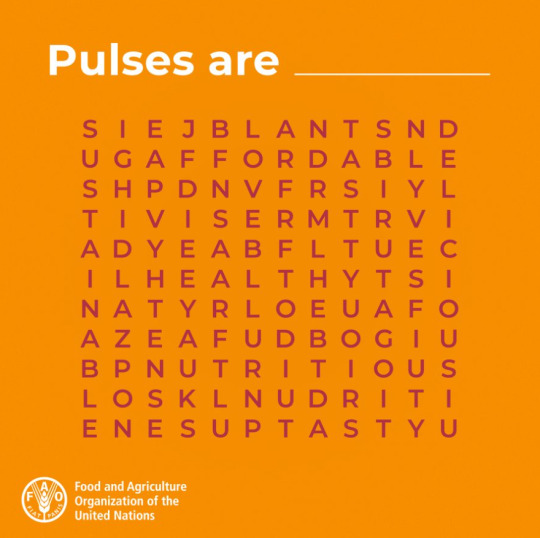
Pulse are....
0 notes
Text
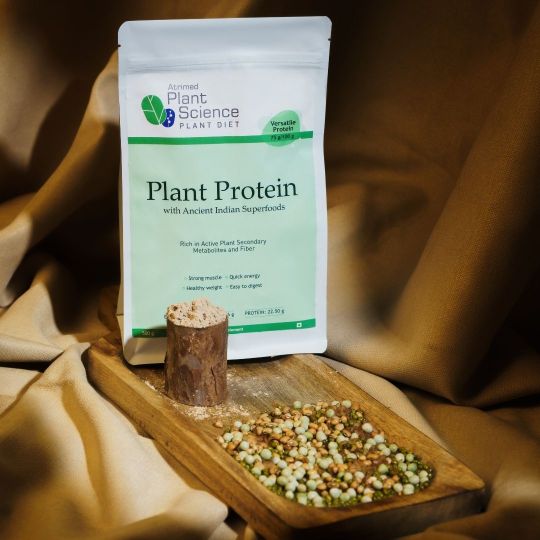
Plant Science: Elevate Your Health with Premium Plant Protein
Discover the power of Plant Science's premium plant protein, sourced for optimal health. Elevate your nutrition journey with our natural, sustainable, and delicious protein solution. Fuel your body the Indian way!
0 notes
Text
instagram
2 notes
·
View notes
Photo

via Giphy https://ift.tt/rcjI2TZ
2 notes
·
View notes
